Tianjin (Beijing, China)
Cruise Port schedule, live map, terminals, news
Port Tianjin cruise ship schedule shows timetable calendars of all arrival and departure dates by month. The port's schedule lists all ships (in links) with cruises going to or leaving from Tianjin, Beijing, China. To see the full itineraries (ports of call dates and arrival / departure times) and their lowest rates – just follow the corresponding ship-link.
| Day | Ship | Arrival | Departure |
|---|---|---|---|
| 3 March, 2026 Tuesday | 05:00 | 04 Mar, 17:00 |
Port Tianjin (aka Tianjin-Xingang) is Northern China's largest seaport, located at the head of Hai River. The port is at approx 50 km (30 mi) from Yellow Sea (Bohai Gulf). The country's capital city Beijing is at approx 150 km (90 mi) away, making Tianjin also cruise port for Beijing City.
The city has population around 15,5 million, ranking it China's 8th largest. The port's cruising season is February through November. In Tianjin are homeported some of the largest vessels from the fleets of major cruise line companies, such as RCI-Royal Caribbean, Princess, Costa Asia.
The easiest way to reach Beijing from Tianjin cruise port is by taking taxi to the train station, then the high speed train (travel time 30 min).
In 2015, the cruise port handled a total of 96 international ship calls and over 400,000 passengers, ranking it China's (and Asia's) largest international homeport. Of those, 40 were from Costa Atlantica (homeported here until December 2015). Most itineraries visit port destinations in Japan, Taiwan and Korea. Some even include ports in Far East Russia. Statistical data for 2015 showed over 1,112 million Chinese cruise ship tourists travelled overseas - an increase of 5461% compared to 2006 when the first international cruise vessel docked in China.
In 2015, Tianjin cruise port implemented the "independent cruise traveller clearance system”, allowing passengers to board the ship as they arrive at the terminal. Previously, travel agencies with group bookings had the entire group waiting for port clearing if even only one booked passenger was late. Also, a new amenity is the port's 72-hour visa-free status for international tourists disembarking from cruise ships. The port also has permission to serve Cruises to Nowhere (with no additional ports of call) and also expanded its duty-free privileges.
Port Tianjin Xingang
Port Tianjin Xingang (translated "Tianjin New Port") is on Bohai Bay's western shore and centered on the Haihe River's estuary. The port is located approx 60 km (40 mi) east of Tianjin City. The port covers a land area of over 120 km2 (46 mi2), with over 32 km (20 mi) of quay shoreline and over 170 cargo ship berths. The port is state-owned and operated as an independent corporation. Port owner is Tianjin's municipality government, which is the sole owner of Tianjin Port Group (port authority / holding company) that manages the port and is its operator and landowner. As landowner, the port authority also provides some municipal services (roads, electric power, fire and police services, water, sewerage, emergency medical assistance).
Port's principal services are stevedoring, shipping agency, cargo and passenger handling, storage and transportation, port infrastructure management, comms-, info- and financial services, electric power supply. The port authority also controls real estate development projects, health care, personnel training, port security, fire protection, facilities and environmental management.
Port's main business is cargo handling and processing. It handles all common types of cargoes - dry bulk, liquid bulk, general, TEU-containers, vehicles, passengers (ferry and cruise). The port is operational the whole year-round.
In 2009 was established Tianjin Port Development Company (Port Group's subsidiary) which injects operational assets in port development projects (bulk-, container- and oil terminals, passenger terminals, also various joint ventures).
In 2013, Port Tianjin handled over 500 million tons of cargo and over 13 million TEUs, ranking it the world's 4th largest cargo port and 9th largest container port. The port is included in the regularly scheduled itineraries of 115+ container shipping lines (operated by around 60 companies), including all the world's top 20 largest.
Tianjin Xingang port's docking facilities (terminals and wharves) include a total of 217 berths, of which 90 with capacity to accommodate vessels with DWT (deadweight tonnage) 10,000+ tons. Of these 90, 72 berths are for ships 50,000+ DWT tons) 30 berths for ships 100,000+ DWT tons, 23 berths for ships 150,000+ DWT tons), 5 berths for ships 200,000+ DWT tons, and 2 berths for ships 300,000+ DWT tons.
All berths / docking terminals are operated by autonomous companies, which are fully-owned by Tianjin Port Group or its subsidiaries. The port has 6 main and 2 temporary anchorage areas, all of which are serve berth / docking waiting, quarantine, vessel inspections and pilotage. They also provide shelter from bad weather or rough seas. Seabed hold is ranked poor to very poor. During winter, anchored ships can experience anchor dragging up to 10 km due to drifting ice.
Routine icebreaking is handled by icebreaking patrols using heavy tugs and dredges. The port has a fleet of 16 icebreaking vessels. The private company CNOOC Bohai Corporation owns 24 icebreakers, used for clearing offshore platforms. When needed, the company leases to the port some of its larger icebreakers.
Port Tianjin also has several shiprepair and shipbuilding / refitting facilities, among which the oldest is Tianjin City Shipyard (in Tanggu port area) founded in 1880. The port's main shiprepair facility is CSIC Tianjin Xingang Shipyard (built in 1939), Adjacent to it is CCCC Bomesc Maritime shipyard ((built in 2007). Sembawang Shipyard (in Nanjiang region) was built in 1997 as the first foreign joint venture shipyard (Singapore and China). Numerous shiprepair companies also offer at berth and anchorage maintenance.
Tianjin Xingang Passenger Terminal serves regularly scheduled ferry and coastal cruise services, while the 2010-opened Tianjin Cruise Homeport serves exclusively cruise ships (read more in the "terminal" section below). Tianjin port cruise tours (sightseeing boat tours) are offered by 2 companies with 30-45min long tripsin the harbour (to the end of Chuanzhadong channel). Both companies' tours start at Tianjin Xingang Passenger Terminal. Tour boats' passenger capacaity is between 130 and 180.
Port's development projects also included building of 3 large-capacity yacht marinas - Binhai Ocean One Yachting Club (built in the Dongjiang Scenic Area and on its artificial beach, has 700 boat berths, plus additional 200 mooring slots), Sino-Australia Royal Yacht City (1000 berths, built in Tianjin Central Fishing Port) and Hi-speed Tianjin Yacht City (built in Binhai Tourist Area, has 3000 berths, serving mainly high-speed boats, sailboats, high-performance yachts).
In May 2020 was completed a modernization project via partnership with Navis (part of Cargotec Corporation - Finland-based manufacturer of cargo-handling machinery for ships-ports-terminals) and ZPMC (Shanghai Zhenhua Heavy Industries Co Ltd, state-owned engineering and manufacturing company for cranes and large steel structures).
- The project included retrofitting a total of 31x gantry cranes at FICT (Five Continents International Container Terminal). Tianjin Port was designed with annual capacity 1,5 million TEUs. Following the modernization, its capacity increased to 2,7 million TEUs.
- The project was launched in 2019 and included FICT's all 31x RMGs (rail-mounted gantry cranes). Previously operated manually, the upgraded cranes are now automated (fully-computerized) and can perform AI tasks like yard-vessel planning, crane scheduling-dispatching tractor-trailer scheduling and dispatching.
- By this container terminal project, Port Tianjin now has increased hourly production (35.2 TEUs per hour/crane), increased (20%) yard throughput capacity, decreased (8,3%) yard vessel berthing time, reduced (30,3%) crane operators, reduced (45,8%) OTR / over the road truck stagnation, reduced (60%) energy consumption per TEU.
Tianjin explosions in 2015
On August 12, 2015, two huge, almost consecutive explosions (within 30 sec of each other) occurred at one of the port's container storage stations.
Chinese officials announced that the initial blast was from hazardous materials stored in shipping containers, at a warehouse owned by "Tianjin Dongjiang Port Rui Hai International Logistics" - a company specializing in storage, transfer and distribution of hazardous materials.
The force of the blasts resulted in smashed buildings, mangled shipping containers, thousands of burned cars. The second explosion was more powerful producing an earthquake (Richter magnitude scale 2,9) with total energy equivalent of 28 tons of TNT.
The explosions damaged a total of 304 buildings, 12428 cars and 7533 TEU-containers.
During the accident, RCI-Royal Caribbean didn't change the scheduled departure of Mariner of the Seas (August 15, 4-night cruise to Fukuoka Japan).
Tianjin cruise terminal
Port Tianjin has two passenger terminals - the old "Tianjin Xingang Passenger Terminal" (serving ferry and coastal cruise shipping services) and the new "Tianjin Cruise Homeport" (serving exclusively cruise ships).
Tianjin Xingang Passenger Terminal
Tianjin Xingang Passenger Terminal is operated by the port's subsidiary "Tianjin Passenger Company". The facility serves all the regularly scheduled ferries, as well as local smaller vessels operating on coastal cruises.
From Tianjin operate 2 main ferry shipping lines plus one in the summers only. These companies run Ro-Ro () passenger and car) ferry ships. At this terminal are also handled ships operating on 2 international destinations - to Japan (Kobe) and South Korea (Incheon), and also 1 domestic destination - to Liaoning Province (Dalian).
Tianjin Cruise Homeport ("Tianjin International Cruise Terminal")
Tianjin Cruise Homeport is a dedicated cruise terminal facility located on Dongjiang peninsula's southern tip. The passenger terminal was inaugurated in 2010 and is where all larger cruise vessels are homeported (to operate roundtrip itineraries from Tianjin).
The cruise terminal covers a land area of 8 hectares 0,08 km2) and has annual passengers’ capacity is 500,000. Currently, the cruise port has 2 berths. They have total quay length 625 m (2050 ft), which allows two big-sized cruise ships (even the world's largest, of 225,000 GT tons) to be docked simultaneously. The cruise port's development plan includes building 6 more berths.
The complex area of the terminal offers duty-free shopping, hotels and eateries. There are customs and migration facilities. On the second floor of Tianjin cruise port terminal building there is a leisure area. The passengers can visit an art gallery or a museum. The area of the port also offers beach and peninsula, both man-made. Parking: at the cruise terminal is not available.
Tianjin tours, shore excursions, hotels
City Tours and Shore Excursions
- The Hai River: take a tour along the river and view modern city skylines with old buildings (1860-1940) in western style. The most famous are the Tianjin Railway Station and the the Wanghailou Church.
- Notre Dame des Victories: Hai River’s norther bank. The high cathedral was build after the introduction of the Catholicism, in 1869. the last re-built of the building is from 1983. It was due to the Tangshan earthquake destruction in 1976.
- Ancient Culture Street: the enter is under an arch southwest from the Notre Dame des Victoires. It is not an original street. It is an 19th century street, rebuilt in the modern city. The most popular shops are Tianyige Four Chinese Writing Tools Shop, the Nirenzhang Clay Figurine Shop and Yangliuqing New Year Poster Shop.
- Tianhou Temple/Tianhou gong: located next to Ancient Culture Street. It commemorates the Sea Goddess. It was built in 1326 AD.
- Dagu Fort/Dagu paotai: located on the Hai River’s south bank.
- Grand Mosque: dates from 1644, the Qing Dynasty period. The architecture is in Chinese Muslim style. It is in the Tianjin’s northwest side.
- Zhou Enlai/Deng Yingchao Museum: The Chinese Communist Party founder, Zhou Enlai studied in Tianjin, later in France. He was the first People’s Republic of China premier. He is a hero from the revolution in China. Deng Yingchao is his wife. In the museum you will discover the story of their life.
- Cruise Industry
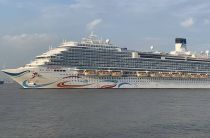
Adora Cruises announces 2025 Summer itineraries from China to Japan and Korea
Adora Cruises Ltd. has announced the launch of two summer itineraries for its cruise vessels, with the domestically built Adora Magic City set to...
February 25, 2025 - Accidents

3 crew injured in engine room fire aboard Adora Mediterranea
A fire broke out aboard Adora Cruises' Adora Mediterranea ship shortly after its arrival at the Port of Jeju, South Korea, on Wednesday, August 14...
August 16, 2024 - Cruise Industry
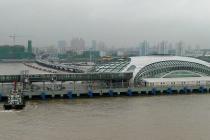
China expands 144-hour/6-day visa-free transit to Henan and Yunnan provinces
Effective July 15th, China's National Immigration Administration has announced the expansion of the 144-hour (6 days) visa-free transit policy to...
July 18, 2024 - Cruise Industry
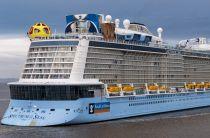
RCI-Royal Caribbean revives operations in China, plans second ship by 2025
RCI-Royal Caribbean International is set to resume cruises for the Chinese market this weekend after a nearly 4-year hiatus, with plans to deploy a...
April 27, 2024 - Cruise Industry
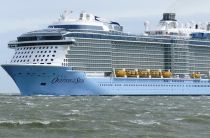
RCI-Royal Caribbean unveils China deployment plan for 2025-2026 season
RCI-Royal Caribbean International unveiled its latest deployment plan for China on Tuesday, March 12, detailing the deployment of two cruises across...
March 15, 2024 - Cruise Industry
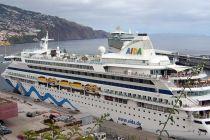
Former AIDAvita cruise ship officially rebranded as Blue Dream Melody for Chinese market
Blue Dream Cruises has confirmed the acquisition of the former AIDA cruise ship AIDAvita, which will undergo rebranding and renaming as Blue Dream...
February 3, 2024 - Cruise Industry

China's Port Tianjin welcomes first international cruise ship in 3 years
On Saturday, July 8th, the cruise ship Dream Charming (Liberia-flagged) arrived at Port Tianjin (North China). This is the first international...
July 11, 2023 - Cruise Industry
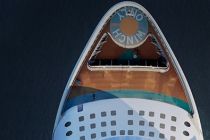
RCI-Royal Caribbean announces new (Hawaii and China) 2022 itineraries
Two new 2022 itineraries have been officially released by RCI-Royal Caribbean International. These are Quantum of the Seas' relocation voyages...
January 30, 2021 - Accidents
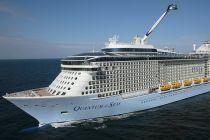
RCI-Royal Caribbean cancels Quantum ship's Alaska 2021 cruises
RCI-Royal Caribbean International's liner Quantum of the Seas will stay in Asia in summer 2021, instead of the planned Alaskan season (May 10 through...
January 23, 2021 - Cruise Industry

Royal Caribbean’s Spectrum of the Seas homeported in Hong Kong 2021-2022
For 2x months (December 2021 through January 2022), RCI-Royal Caribbean’s liner Spectrum of the Seas (max passenger capacity 4819) is to be...
July 21, 2020 - show more news

 52°F
52°F 
 Gentle breeze
Gentle breeze